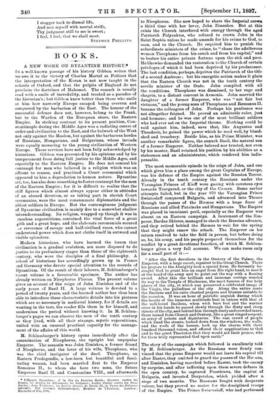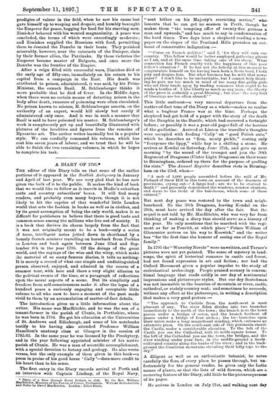BOOKS.
A NEW WORK ON BYZANTINE HISTORY.*
IN a well-known passage of his history Gibbon writes that we owe it to the victory of Charles Martel at Poitiers that the interpretation of the Koran is not now taught in the schools of Oxford, and that the pulpits of England do not proclaim the doctrines of Mahomet. The remark is usually read with a smile of incredulity, and treated as a paradox of the historian's ; but Gibbon knew better than those who smile at him how narrowly Europe escaped being overrun and conquered by the barbarism of the East. The honour of the successful defence does not, however, belong to the Frank, but to the Warden of the European shore, the Eastern Empire. In striking contrast to its present position, Con- stantinople during the Middle Ages was a radiating centre of order and civilisation to the East, and the bulwark of the West not only against the Moslem, but against the barbarous hordes of Russians, Hungarians, and Bulgarians, whose inroads were equally menacing to the young civilisation of Western Europe. These services have not been fully acknowledged by historians. Gibbon was prevented by his opinions and by his temperament from doing full justice to the Middle Ages, and especially to the Eastern Empire. He does not conceal his contempt for men who believed in a religion which was an affront to reason, and practised a Court ceremonial which appeared to him a degradation to human nature. Byzantine art, too, has also done something to foster contempt for the men of the Eastern Empire; for it is difficult to realise that the stiff figures which almost always appear either in attitudes of an absurd devotion, or as taking part in slavish Court ceremonies, were the most consummate diplomatists and the ablest soldiers in Europe. But the contemptuous judgment of Byzantine civilisation is mainly due to a somewhat shallow misunderstanding. Its religion, wrapped up though it was in enseless superstitions, contained the vital force of a great ttith and a great hope, and the elaborate ceremonials secured .m reverence of savage and balf-civilised races, who cannot understand power which does not clothe itself in outward and visible splendour.
Modern historians, who have learned the lesson that civilisation is a gradual evolution, are mere disposed to do justice to its preliminary stages than those of the eighteenth century, who were the disciples of a final philosophy. A school of historians has accordingly grown up in France and Germany who devote special attention to the records of Byzantium. Of the result of their labours, M. Schlumberger's recent volume is a favourable specimen. The author has already written on Nicephorus Phocas. The present volume gives an account of the reign of John Zimiskes and of the early years of Basil II. A large volume is devoted to a period of twenty years, and the learned author has thus been able to introduce those characteristic details into his pictures which are so necessary in medimval history, for if details are wanting in the text, the reader fills them in for himself, and modernises the period without knowing it. In M. Schlum- berger's pages we can observe the men of the tenth century as they lived, with all their strange, mystic superstitions, united with an unusual practical capacity for the manage- ment of the affairs of this world.
M. Schlumberger's history opens immediately after the assassination of Nicephorus, the upright but unpopular Emperor. The assassin was John Zimiskes, a former friend of Nicephorus, and the lover of his wife, Theophano, who was the chief instigator of the deed. Theophano, an Eastern Fredegondis, a low-born but beautiful and fasci- nating woman, had been married first to the Emperor Romans II., to whom she bore two sons, the future Emperors Basil II. and Constantine VIII., and afterwards • L'Eyopee Byzantine: A it' Pin du Diliente Ssicle; Guerres contra les Busses, les Arabes, les Allemands, les Baleares; Luttea Ciroiles contra les Deuz Barden ; Jean Tzimisees; les Jeunes Annie, de Basile II., be Tueur des Baleares (969-9871. Par Gustave Schlumberger, Membre de l'Iustitut. London : Hachette et Cie, 1596. to Nicephorus. She now hoped to share the Imperial crown a third time with her lover, John Zimeskes. But at this
crisis the Church interfered with energy through the aged Patriarch Polyeuktes, who refused to crown John in the Saint Sophia unless he made amends for his crime to God, to man, and to the Church. He required him to punish the subordinate ministers of the crime, to "chase the adulterous woman Theophano from his couch and from his capital," and to bestow his entire private fortune upon the sick and poor.
He likewise demanded the restoration to the Church of certain privileges of which it had been deprived by his predecessor.
The last condition, perhaps, deprives the Patriarch of the title of a second Ambrose ; but his energetic action makes it plain that the Eastern Church was not in the tenth century the servile minister of the State. John complied with all the conditions. Theophano was dismissed, to her rage and chagrin, to a distant convent in Armenia. John married the daughter of a former Emperor, who was " not fair but virtuous," and the young sons of Theophano and Roman= IL became the colleagues of John. Perhaps his penitence was not altogether feigned. He proved an admirable ruler, just and humane; and he was one of the most brilliant soldiers who had ever sat on the Imperial throne. Nothing could be said against him, indeed, save that, like Augustus and.
Theodoric, he gained the power which he used well, by blood- shed and treachery. Beside him, as his Prime Minister, was another remarkable figure, the eunuch Basil, the natural son of a former Emperor. Neither beloved nor trusted, not even by his master, Basil retained his position by his abilities as a statesman and an administrator, which rendered him indis- pensable.
The most memorable episode in the reign of John, and one which gives him a place among the great Captains of Europe, was his defence of the Empire against the Russian Terror..
Already in the tenth century the Russians under the Varangian Princes of Kieff were gazing with covetous eyes towards Tzargarad, or the city of the Cxsars. Some earlier attempts failed, but in the year 970 the Varangian Prince Swiatoslaff conquered Bulgaria, and advanced into Thrace through the passes of the Htemns with a huge force of Russians and allied Patzinaka and Hungarians. The Empire
was placed in imminent peril, especially as the Emperor was
absent on an Eastern campaign. A lieutenant of the Em- peror, Bardas Skleros, managed to check the Russian advance, and they retired behind the Ha31M18 to wait for the spring that they might renew the attack. The Emperor on his return resolved to take the field in person, but before doing so, he, his army, and his people prepared themselves for the conflict by a great devotional function, of which M. Schlum- berger gives a very full account. We can make room only for a small part of it :—
" After the first devotions in the Oratory of the Palace, the Emperor, with a large escort, repaired to the Great Church. There his prayers to the Almighty took a special form. He fervently be- sought God to grant him an angel from His right hand, to march at the head of the army and to point out the way with a flaming sword. After this the brilliant and immense cortege wended its way to the Temple of Blachern, the most famous of the holy places of the city, in which was preserved a celebrated image of the Virgin, the palladium of the city Along the entire route the Basileus and his suite chanted prayers and litanies suitable to the occasion. It was an hour of patriotic anguish during which the hearts of the immense multitude beat in unison with that of the well-loved Basileus, when with bare feet and the warrior cross in his hands he passed slowly through the flinty and steep streets of the city, and behind him through dusty and crowded lanes, there issued from Church and Oratory, like a great ringed serpent, an array of priests and dignitaries. The vast crowd of people which lined the streets, looked down from the windows, the walls, and the roofs of the houses, took up the chorus with their hundred thousand voices, and offered their supplications to God and to the great Theotokos that they would aid their prince, wha for them truly represented God upon earth."
The story of the campaign which followed is excellently told , by M. Schlumberger. As the Russians were firmly con- vinced that the pious Emperor would not leave his capital till after Easter, they omitted to guard the passes of the Tim nue,
and Zimiskes, having marched before Easter, took the enemy by surprise, and after inflicting upon them severe defeats in the open country, he captured Presthlava, the capital of Bulgaria, and invested Dorystolon, which yielded after a siege of two months. The Russians fought with desperate valour, but they proved no match for the disciplined troops
of the Empire. The Prince Swiatoslaff, who had performed prodigies of valour in the field, when he saw his cause lost gave himself up to weeping and despair, and humbly besought the Emperor for peace, begging for food for his starving men. Zimisker behaved with his wonted magnanimity. A peace was concluded, the terms of which were exceedingly moderate; ana Zimiskes supplied the Russians with food, permitting them to descend the Danube in their boats. They perished miserably, however, near the cataracts of the Dnieper, slain by their former allies, the Patzinaks. By these victories the Emperor became master of Bulgaria, and once more the Danube was the frontier of the Empire.
After a reign filled with successful wars, Zimiskes died at the early age of fifty-one, immediately on his return to his capital from a campaign in the East. His death was attributed to poison, administered, it was said, by his Prime Minister, the eunuch Basil. M. Schlumberger thinks it more probable that he died of fever. In the Middle Ages, when there were no certain means of detecting poison in the body after death, rumours of poisoning were often circulated. No poison known to science, M. Schlumberger asserts, on the authority of an expert, would kill slowly bat surely if administered only once. And it was in such a manner that Basil is said to have poisoned his master. M. Schlumberger's work is sumptuously got up and beautifully illustrated with pictures of the localities and figures from the remains of Byzantine art. The author writes learnedly but in a popular style. We can cordially commend his volume, which has cost him seven years of labour, and we trust that he will be able to finish the two remaining volumes, in which he hopes to complete his task.



































 Previous page
Previous page